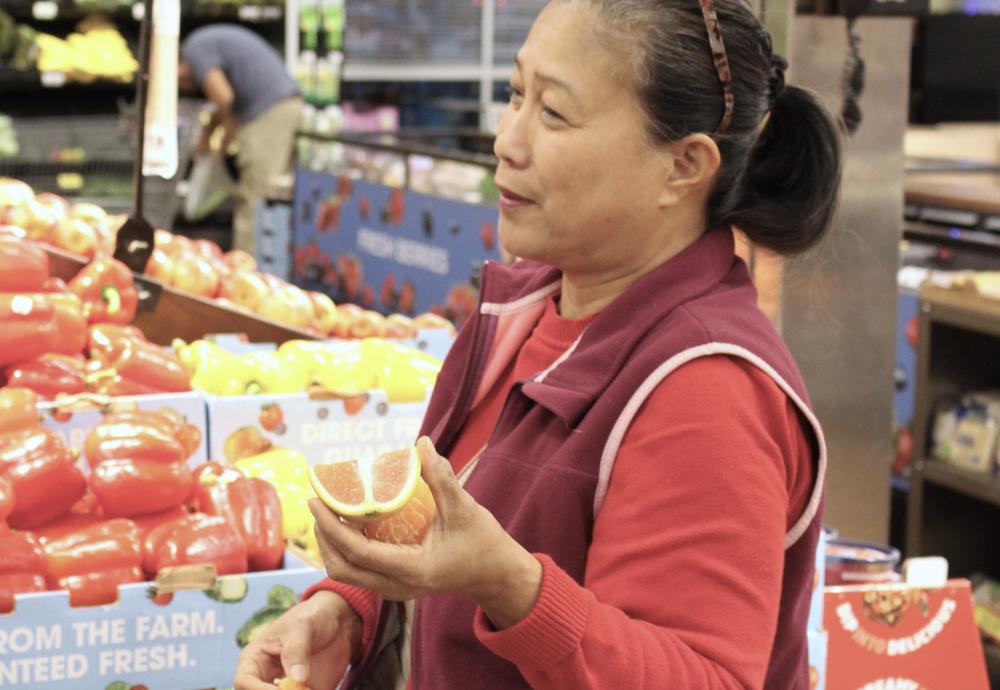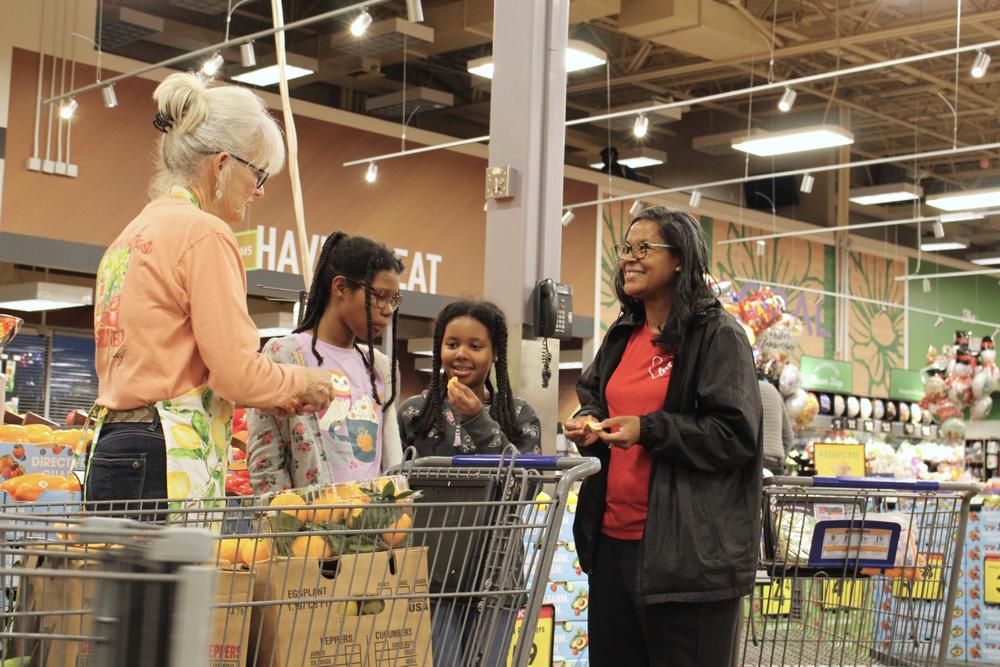
Caption
Inside a Kroger grocery store in Bonaire, Ga., Jocelyn Clark tries fresh citrus products from Lindy Savelle's JoNina Farm.
Credit: Ellen Eldridge/GPB
LISTEN: Finding local produce often means going to the farmer’s market, which not everyone can do. Now a new app is connecting conventional grocers and local growers. GPB’s Ellen Eldridge has more.

Inside a Kroger grocery store in Bonaire, Ga., Jocelyn Clark tries fresh citrus products from Lindy Savelle's JoNina Farm.
Jocelyn Clark is in the produce section of her regular grocery store.
It’s pretty typical: Fluorescent lighting illuminates piles of fruit and veggies — and, off to the side, balloons and flowers are for sale.
Clark’s doing her normal shopping.
But now she has been lured over to a sample display of citrus fruit, picked this morning.
"I love organic produce and it helps a lot with the community instead of going overseas," she said.
Clark said she would buy more local produce, but she doesn’t shop at the farmer’s market.
"I'm busy and, plus, it's too far away," she said. "So it's better to come over here than to go far [for] the same thing. You know, the gas prices going up like that. So, might as well come over here."
"Here" is a Kroger store in Bonaire in Houston County, Ga. This grocery store carries the citrus fruits Clark and others are tasting.
"It was juicy and good," Clark said. "My goodness, it's an impressive taste."
The cara cara orange she tried was grown in Georgia, just two hours away.
"We just grow citrus on our farm, primarily," Lindy Savelle told GPB."That's lemons, limes, grapefruit, navels…."
Savelle and her husband, Perry, own JoNina Farm in Thomas County, about 230 miles south of Atlanta and 60 miles west of Valdosta.
For the Savelles’ fruit to get to Bonaire, there needs to be a connection to the giant retailer grocers.
That's where Foodshed comes in.
"A lot of people ask, 'Why don't big grocers get produce from the farms that are nearby them?'" said Dr. Daniel Beckmann, the company's founder.
The answer? Buying power.
There are massive contracts that are essentially global because big food stores must stock their shelves to satisfy customer demand across whole regions.
"And the farms that would be in your local area often don't fulfill the volume for an entire country," Beckmann said.
So, the Foodshed app helps grocers look closer to home for produce, to local farms.
The app also "allows for a farmer such as Lindy to be able to grow her business, grow really good quality produce that has really good flavor," he said.
Lindy Savelle said if someone in Georgia bought mandarin oranges recently, they likely came from somewhere in Latin America.

Lindy Savelle (left) shares citrus fruit grown at her JoNina Farm with Alexis DeJarnette and daughters Yva and Ysabel.
Measuring the carbon footprint of shipping produce is still tough to do, but, in general, the longer food travels, the more transportation emissions add to climate warming.
Ironically, Georgia’s citrus industry exists because of climate change, which is making winters warmer.
Savelle said Georgia now has a Citrus Commission with about 150 member growers promoting the industry and a record-high number of 570,000 citrus trees planted in Georgia 2023.
Beckman called these citrus farmers pioneers.
"These are regular people in a lot of cases that decided to plant these trees," he said. "And they didn't know for years whether or not this was going to work."
In the aisle at Kroger, shopper Alexis DeJarnette and her daughters said it’s working well.
"It's very sweet and juicy," she said. "And we like local, so we're going to definitely look into purchasing some."
Lindy Savelle hopes to fill as many stores as possible with her Georgia-grown citrus.